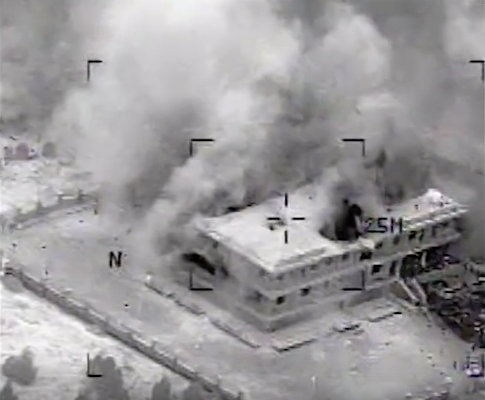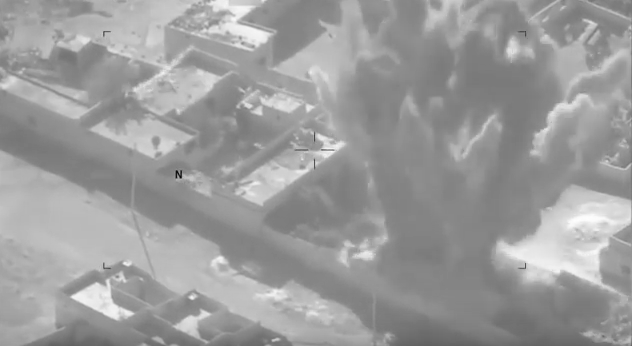Students unaware of U.S. military involvements

By Elise Leasure
America is the strongest military power in the world. In 2015, the U.S. government expended a whopping $598.5 billion in military spending, according to NationalPriorities.org. This means that the United States spends more money per year on the military than China, Saudi Arabia, Russia, United Kingdom, India, France and Japan, combined. The strength and power of the United States military is definitely common knowledge, but the fact that America is spending much of its military budget on foreign airstrikes, however, is not.
As of October of 2016, the United States is exercising airstrikes on seven different Middle Eastern and African countries: Syria, Iraq, Afghanistan, Libya, Somalia, Pakistan and Yemen.
So how come this fact is rarely spoken about in the media, and why is it not common knowledge among the American people?
A recent poll of 100 CFHS students, 50 male and 50 female, of all three classes showed that 31 percent of students are able to name at least one of the seven countries targeted by United States airstrikes. That leaves 69 percent unable to name any.
The most known of American conflicts is the battle against terrorist groups such as ISIS and the Taliban. The news media and frequent presidential debates are overwhelmed with talk of ISIS and the conflicts they and other radical religious groups are causing throughout the Middle East.
The United States has been combating radical terrorist groups such as the Taliban and dictatorship in Iraq off and on for 25 years. The involvement of U.S. forces in Afghanistan and Iraq is nothing new. Because ISIL is located in Syria and Iraq and the Taliban of Afghanistan has bled conflict into Pakistan, America frequently carries out airstrikes in those four countries in attempt to combat terrorist groups.
According to the Long War Journal, since 2004, Pakistan has seen 392 airstrikes targeted at killing terrorist leaders of Al-Qaeda and ISIS based in northwest Pakistan. As for Syria, America’s goal is not only to eliminate the threats of ISIS, but to aid the humanitarian disaster occurring within the borders of Syria by knocking out the Syrian dictator.
Syria the was most common country named by students, with 82 percent of students polled who named at least one country being able to name Syria.
The United States has been leading intervention in Syria since the beginning of the Syrian Civil War in 2011. Initially, the United States provided non-lethal aids to the Syrians, like food and trucks, but soon the United States began providing training, money and even commanders to the rebels of the Free Syrian Army.
In September 2014, the United States began positions of surveillance on ISIS, and also began airstrikes on ISIS within Syria with the help of Bahrain, Jordan, Qatar, Saudi Arabia and the United Arab Emirates.
Yemen is one of the other countries that the United States is aggressively targeting, with help from Saudi Arabia. Regarding Yemen, many poll respondents had no idea the country existed in the first place, let alone that the United States has conducted at least 89 airstrikes within the country.
The United States has been aiding the Saudis for over a year in their war against the Houthis, a fundamentalist religious political movement based in Yemen. The United States also approved a $1.3 billion arms sale to Saudi Arabia in November 2015, in addition to previous intelligence support.
The Saudi-led war effort in Yemen is vicious as of 2016, with millions of civilians left displaced and starving. There were also missiles fired at U.S. warships by the Houthis, preceding U.S. efforts to help the Saudis.
United States involvement in Yemen is not covered by the media because many do not see a reason for involvement. The United States continues to aid Saudi Arabia as it wages its ruthless war. So far, the United States has kept its retaliation relatively general, only targeting radar structures instead of areas where civilians could be living, but as the war escalates and the Houthis continue to fight back, the potential for U.S. presence in the war rises. Say the missiles actually hit and killed U.S. sailors, it is safe to say that it would have lead to U.S. retaliation that is not as gentle as it has been for the past year.
A question for Americans to consider about conflict in Yemen is whether or not it is right for our government to be putting our soldiers at risk of death just to help a ceaseless war led by the dictator of a country that rules in the name of a god.
That leaves two African countries, Libya and Somalia. The conflict in Libya is a difficult and complicated timeline to follow. Fractured government and a rebellion against a tyrannical leader that resulted in civil war left Libya in shambles. In 2011, the United States began military intervention, like air strikes, against Gaddafi and his militants within Libya on the grounds of preventing a humanitarian crisis and stopping the killings of Libyan civilians.
Since the 2012 NATO-supported killing of the Libyan dictator occurred, there was an attempt at transitional government, and four Americans were killed in an attack on a U.S. consulate in Benghazi, Libya. Islamic State militia groups also seized control of eastern Libya in 2014.
The U.S. involvement in Libya is one that is rooted in many different causes, the most recent being the rise of Islamic State control of the country. U.S. Special Operations forces and surveillance have taken an active role in Libya’s increasingly desperate fight to stop the spread of the ISIS front across the country.
Airstrikes in Libya in 2016 have been conducted using drones as well as manned warplanes, and in March of 2016, U.S. military officials concluded that airstrikes were planned for up to 40 targets throughout Libya that have happened as recent as August.
Though the true scope of the recent special operations in Libya is blurry, the United States continues to push against a long line of tiresome conflicts that the country has faced.
As for Somalia, the United States has been combatting Al-Shabab, a Somali jihadist terrorist group allied to Al-Qaeda that is attempting to turn Somalia into an Islamic state, since 2008. Al-Shabaab has taken blame for countless attacks throughout Somalia that have killed journalists, civilian leaders and aid workers from around the globe. The group has also targeted other countries such as Kenya and Uganda, and is responsible for a 2010 suicide bombing that killed a U.S. citizen. 
There have been 23 air strikes in Somalia that were carried out by the United States from 2001-2016, according to The Bureau of Investigative Journalism. In the years since attacks began in the country, drones have become the most common way to conduct airstrikes, surpassing manned aircraft and cruise missiles.
The fight against Al-Shabaab has caused a humanitarian disaster within the country, as well. In 2011, the United Nations declared a famine within two southern Somali regions, due to the civil war within the country where the group has been fighting against Somali government to establish their Islamic state. The United States continues to fund humanitarian and surveillance efforts in Somalia as they combat terrorism.
With education being one of the most dominant tools in the world for increasing economic growth and prosperity and promoting peace among societies and nations, it is important that students seek knowledge about where their country is making themselves a part of conflict.
Students becoming educated about foreign conflicts will also allow us to draw from previous experiences to help combat new problems in the future.
Young people also have access to reach corners of the world previous generations did not through social media. This communication results in an expansion of knowledge of topics like culture, context, tolerance, peace and humanity.
Being educated on foreign conflicts allows students to become better voters in the future because they will have knowledge about how and where the United States conducts itself. It also prevents future candidates from getting away with superficial and flat foreign policy, and a generation consumed with the United States being an international police officer to combat deep, systematic and overdrawn problems in foreign countries.









You must be logged in to post a comment Login